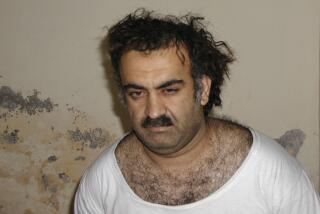U.S. Evidence May Aid 9/11 Defendant
- Share via
HAMBURG, Germany — A Moroccan man facing retrial here on charges of aiding the Sept. 11 hijackers knew nothing of the plot, according to interrogations by U.S. officials of two key suspected Al Qaeda operatives.
Summaries of the interrogations were disclosed in court Wednesday after Germany’s two-year effort to persuade Washington to share intelligence. The new information heightened the drama surrounding the case of Mounir Motassadeq, a 30-year-old electrical engineering student and the only man convicted in the attacks that killed nearly 3,000 people.
The summaries offer a narrow glimpse of events leading up to Sept. 11. The U.S. refused to provide detailed transcripts or to allow the suspected operatives to appear in court. Statements by Ramzi Binalshibh and Khalid Shaikh Mohammed, the alleged mastermind of the plot, suggest that Motassadeq was not informed of the plan and was not in the tight circle of extremists that became known as the Hamburg cell.
Those characterizations appeared to be a setback for prosecutors. But a fax sent to the court by the U.S. Justice Department noted that there were concerns about the reliability of Binalshibh and Mohammed. “Because of inconsistencies by at least one of the individuals there may be reason to question the assertions regarding Mounir Motassadeq,” the fax said, adding that the suspects may be “employing counter-interrogation techniques.”
Federal investigators have said that Binalshibh has not been a reliable source of information. In its final report published last month, the Sept. 11 commission said evaluating the credibility of interrogations was “challenging.”
In the new summaries, at least some information attributed to Binalshibh is contradicted by other intelligence. For example, Binalshibh is quoted in the summaries as saying Motassadeq had no involvement in the Sept. 11 attacks. But he is also quoted as saying two key Al Qaeda operatives, a Yemeni named Tawfiq Attash Khallad and an Indonesian known as Hambali, had no involvement in the attacks. There is substantial other information, some of it detailed in the Sept. 11 commission’s reports, implicating those two men in crucial roles in planning the attacks.
After reviewing the interrogation summaries, Presiding Judge Ernst-Rainer Schudt said: “We have to think about what this means for the trial.”
The Motassadeq case has unfolded amid the larger world of diplomacy and intelligence gathering that has strained relations between the United States and Germany. Until this week, Washington had refused to grant the Hamburg court access to its interrogations, saying such disclosures could hinder other investigations. The German judicial system has blamed the U.S. for jeopardizing two high-profile terrorist trials.
Prosecutors here have been under pressure from politicians and the media since Motassadeq’s arrest in 2001. He was convicted last year and sentenced to 15 years in prison. But he won a retrial after a second alleged Moroccan accomplice, Abdelghani Mzoudi, was acquitted of similar charges. The judge in Mzoudi’s case said the defendant couldn’t get a fair trial without testimony from suspects in U.S. custody.
Motassadeq’s lawyers asked the court to dismiss the charges, arguing that statements made by Binalshibh and Mohammed should not be admissible because they may have been extracted through torture by U.S. interrogators.
“Everything points to an acquittal now,” said Josef Graessle-Muenscher, one of the defense lawyers.
The court Wednesday was eager to study the interrogations. A father of two, Motassadeq looked thinner than when he was released from prison this year. His beard was longer and he sat quietly behind bulletproof glass, taking notes while the U.S. Justice Department papers were translated to German.
Binalshibh, according to eight pages of summaries, said he met Motassadeq in Hamburg in 1995 or 1996 at meetings for Arab university students who “engaged in vitriolic anti-U.S. discussions.” Binalshibh said, however, that the Hamburg group was limited to himself and three of the hijackers: Mohamed Atta, Marwan Al-Shehhi and Ziad Samir Jarrah. He said he and the hijackers “never discussed actual operations and they never formed a terrorist cell to commit jihad.”
The summary says Binalshibh stated that Motassadeq “was not privy to the activities ... regarding the 11 September operation.” Motassadeq acknowledged friendships with Atta and other members of the cell. He signed Atta’s will and trained in an Al Qaeda camp in Afghanistan. He testified that he had no knowledge of the group’s plot.
Prosecutors argue that Motassadeq provided logistical and financial support for the cell, including arranging for apartments and making at least one money transfer.
The interrogation summaries provided only a fraction of what German authorities were requesting. U.S. intelligence officials have shared specifics with their German counterparts. They repeatedly have refused to disclose sensitive information in trials, including those in U.S. courts. In a letter accompanying the summaries, the U.S. said the German legal system is getting the same access “afforded to the Department of Justice’s own prosecutors.”
Several senior U.S. officials had no comment on whether the information was released as a last resort, in an effort to prevent Motassadeq from walking free.
“In our ongoing efforts to cooperate with our German allies, the Justice Department made certain information available to the court,” said Mark Corallo, chief spokesman for the Justice Department. “We have been cooperating to the fullest extent possible since the beginning of these proceedings, but we always have to act in the best interests of the national security of the United States.”
Times staff writer Fleishman reported from Berlin and special correspondent Laabs from Frankfurt. Staff writers Terry McDermott in Los Angeles and Josh Meyer in Washington contributed to this report.
More to Read
Sign up for Essential California
The most important California stories and recommendations in your inbox every morning.
You may occasionally receive promotional content from the Los Angeles Times.














